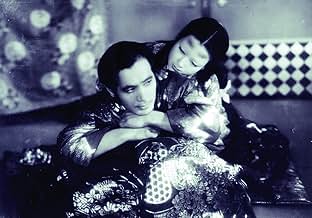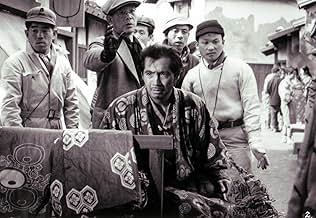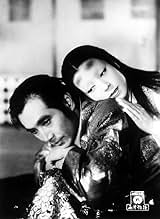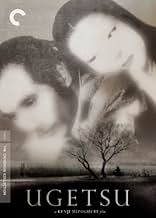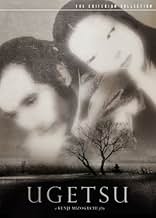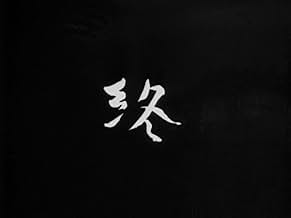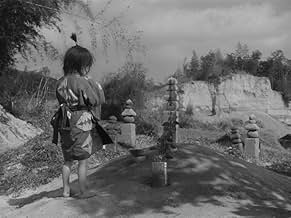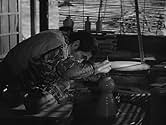Les Contes de la lune vague après la pluie
Titre original : Ugetsu monogatari
- 1953
- Tous publics
- 1h 36min
NOTE IMDb
8,1/10
27 k
MA NOTE
Genjūrō, potier, part vendre sa marchandise en ville avec sa sœur Ohama et son beau-frère Tōbei, laissant femme et enfant au village. Là, les ambitions personnelles des deux hommes les éloig... Tout lireGenjūrō, potier, part vendre sa marchandise en ville avec sa sœur Ohama et son beau-frère Tōbei, laissant femme et enfant au village. Là, les ambitions personnelles des deux hommes les éloignent de leur famille et en causent leur malheur.Genjūrō, potier, part vendre sa marchandise en ville avec sa sœur Ohama et son beau-frère Tōbei, laissant femme et enfant au village. Là, les ambitions personnelles des deux hommes les éloignent de leur famille et en causent leur malheur.
- Réalisation
- Scénario
- Casting principal
- Nommé pour 1 Oscar
- 6 victoires et 2 nominations au total
Eitarô Ozawa
- Tôbei
- (as Sakae Ozawa)
Avis à la une
One of the greatest of all Japanese films, this makes many Top 10 lists of the greatest films of all time.
Genjuro (Masayuki Mori), a potter, and his brother Tobei (Eitaro Ozawa), a farmer, are seeking fame and fortune, or fortune and fame as the names are listed.
The lake scene is not to be missed. It is beautiful and creepy. After being warned about pirates, the two me head off alone and meet Machiko Kyo, who was also the woman in Rashomon.
There is a beauty in this film that can't be described adequately. The camera paints a picture that is enchanting and melodic.
Kenji Mizoguchi, who went on to do the magnificent Sansho the Bailiff, has given us a pleasure that will be enjoyed again and again.
Bruce Bennett at the New York Sun said it best, "When the name Kenji Mizoguchi is intoned, every piece of camera equipment on earth should execute a deep bow."
Genjuro (Masayuki Mori), a potter, and his brother Tobei (Eitaro Ozawa), a farmer, are seeking fame and fortune, or fortune and fame as the names are listed.
The lake scene is not to be missed. It is beautiful and creepy. After being warned about pirates, the two me head off alone and meet Machiko Kyo, who was also the woman in Rashomon.
There is a beauty in this film that can't be described adequately. The camera paints a picture that is enchanting and melodic.
Kenji Mizoguchi, who went on to do the magnificent Sansho the Bailiff, has given us a pleasure that will be enjoyed again and again.
Bruce Bennett at the New York Sun said it best, "When the name Kenji Mizoguchi is intoned, every piece of camera equipment on earth should execute a deep bow."
In Japan, due to its Buddhism and Shinto culture, the term Ghost is an description for evil of the spirits world. and the idea of spirits which dispatch from its physical body are describe as phamton. from the difference associate with these 2 terms we can understand that even in spirits there is description for the good and bad spirits. this is similar to the Chinese mythology for ghost. even if the spirits was wrongly accused, and coming back to human world for its revenge, this is still consider as an spirits rather than ghost, as it has its positive of motive and would not harm people who is not associate with his death. since spirits normally does not appear in the human world, and its appearance often associate with unfinished matter or grudge. which is the main characteristic for most of the Japanese film.
the most impressive Japanese ghost story is Ugetsu monogatari(1953), it was base on the novel with the same title. we can analysis the idea of Japanese ghost film via 2 aspect of the film.
Firstly, while Genjuro was selling pottery in the market, he was been order by Lady Wakasa and its nurse maid to send the good to their mansion personally, which was the starting point of ghostly love relationship.
By the hand of prestige cinema photographer, Kuzo Miyagawa, the mystic atmosphere, the trembling music of sanmise, the ghostly voice of men grudging, gives the mansion an appeal of a haunted mansion. The use of top view camera technique with the character Noh play like appeal,gives the scene much more mysterious, secluded, ghostly, euphoria aspect of the fantasy world. which above all explores the art of Japanese traditional beauty.although it is an black and white film, but Kuzo Miyagawa create an color of bewitch ghostly character on Lady Wakasa.
The very motive for the existence of Lady wakasa was to have a taste of love, as she was kill before she can understand what love is, after resurrect by the nursemaid, she have become and spirits that looking for the ideal man to love. that is why she put a spell on Genjuro. to love not to hurt.
The second aspect for Genjuro associate with spirits was at the end part of the movie, while He push open the cripple door of his home, he saw an empty house, yet after the camera return an image of the room, Miyagi, Genjuro's wife appear, who was setting beside the stove alone tailoring clothes, and waiting for his husband to eat and change into comfy kimono, Genjuro feel extremely tire after all the events therefore he quickly falls asleep, next morning, when the villager master realize he is return went into his home and explain the tragic of her wife. and the disappearance of his son, coincidentally, his son returns in the very moment.
The movie finish with a long shot as the kid playing beside his mothers grave while Genjuro praying, which symbolize Miyagi has finally saw the father and son reunited and now he is able to rest in peace, and fly to heaven.
The movie demonstrate the childish, stubbornness and foolishness of male. yet it purify the females character as loving and sincere, which demonstrate no scary or horrifying intention to the viewer when associate with ghost. infect we associate with the idea of gentleness, shyness of its character. the eternal serenity towards the love one can only be associate with ghostly figure in a time transcend world.
the most impressive Japanese ghost story is Ugetsu monogatari(1953), it was base on the novel with the same title. we can analysis the idea of Japanese ghost film via 2 aspect of the film.
Firstly, while Genjuro was selling pottery in the market, he was been order by Lady Wakasa and its nurse maid to send the good to their mansion personally, which was the starting point of ghostly love relationship.
By the hand of prestige cinema photographer, Kuzo Miyagawa, the mystic atmosphere, the trembling music of sanmise, the ghostly voice of men grudging, gives the mansion an appeal of a haunted mansion. The use of top view camera technique with the character Noh play like appeal,gives the scene much more mysterious, secluded, ghostly, euphoria aspect of the fantasy world. which above all explores the art of Japanese traditional beauty.although it is an black and white film, but Kuzo Miyagawa create an color of bewitch ghostly character on Lady Wakasa.
The very motive for the existence of Lady wakasa was to have a taste of love, as she was kill before she can understand what love is, after resurrect by the nursemaid, she have become and spirits that looking for the ideal man to love. that is why she put a spell on Genjuro. to love not to hurt.
The second aspect for Genjuro associate with spirits was at the end part of the movie, while He push open the cripple door of his home, he saw an empty house, yet after the camera return an image of the room, Miyagi, Genjuro's wife appear, who was setting beside the stove alone tailoring clothes, and waiting for his husband to eat and change into comfy kimono, Genjuro feel extremely tire after all the events therefore he quickly falls asleep, next morning, when the villager master realize he is return went into his home and explain the tragic of her wife. and the disappearance of his son, coincidentally, his son returns in the very moment.
The movie finish with a long shot as the kid playing beside his mothers grave while Genjuro praying, which symbolize Miyagi has finally saw the father and son reunited and now he is able to rest in peace, and fly to heaven.
The movie demonstrate the childish, stubbornness and foolishness of male. yet it purify the females character as loving and sincere, which demonstrate no scary or horrifying intention to the viewer when associate with ghost. infect we associate with the idea of gentleness, shyness of its character. the eternal serenity towards the love one can only be associate with ghostly figure in a time transcend world.
In a time of unceasing turmoil, as sixteenth-century Japan is ravaged by marauding bands of warriors, the ambitious and hard-working potter, Genjuro, and his aspiring samurai brother, Tobei, risk a dangerous trip to the bustling city to sell their wares, seeking quick profit. The two 16th century Japanese peasants venture from their homes in pursuit of dreams, resulting in fateful consequences. As Tobei abandons his wife to buy a samurai outfit and seek fame and fortune, while Genjuro becomes involved with a ghost woman.
The classic film ambition, family, and war that established Migozuchi's reputation outside of Japan. A marvellous mix of drama, comedy, action and supernatural events with nifty camera movement . Based on two stories by the 18th century writer Akinara Ueda (often described as the japanese Guy de Maupassant), dealing with two peasants in pursuit of dreams and encounter little more than their own hapless folly and a bit of the supernatural. Gorgeous cinematography in black and white, inspired by nihonga (traditional Japanese painting) and woodblock prints. ¨Ugetsu¨ was one of a handful of Japanese films to sweep up awards at European festivals in the early 50s. Its reputation as one of Migozuchi's finest works and a landmark of the Japanese art cinema has remained undented ever since. The filmmaker's unique stablishment of atmosphere by means of long shot, long takes, sublimely graceful and unobtrusives camera movement, is everywhere evident in his treatment of the legend of a potter who leaves his family to market his wares during the ravages of a civil war, and is taken in and seduced by a ghost princess.
This ravishingly composed, evocatively made motion picture was competently directed by Kenji Migozuchi. He is said to be the first major feminist film-maker, his films frequently reveal women's positions in Japanese society, he includes long takes, often held for the duration of the scene. Migozuchi is cited Marcel L'Herbier, Josef von Sternberg, William Wyler and John Ford as his influence. Migozuchi is one of the rare directors who has helmed over 100 films, including the following: ¨Street of shame, Princess Yang Kwei Fei, Shin Heike Monogatari, The crucified lovers, Sansho the bailiff, A Geisha, Life of Oharu, Utamaro and his five women, Ronin part 1 and 2, The story of the late Chrysanthemum, Osaka elegy, and Sisters of the Gion¨. Rating Ugetsu: 7.5/10. Better than average, well worth watching. The film will appeal to Japanese classic fans.
The classic film ambition, family, and war that established Migozuchi's reputation outside of Japan. A marvellous mix of drama, comedy, action and supernatural events with nifty camera movement . Based on two stories by the 18th century writer Akinara Ueda (often described as the japanese Guy de Maupassant), dealing with two peasants in pursuit of dreams and encounter little more than their own hapless folly and a bit of the supernatural. Gorgeous cinematography in black and white, inspired by nihonga (traditional Japanese painting) and woodblock prints. ¨Ugetsu¨ was one of a handful of Japanese films to sweep up awards at European festivals in the early 50s. Its reputation as one of Migozuchi's finest works and a landmark of the Japanese art cinema has remained undented ever since. The filmmaker's unique stablishment of atmosphere by means of long shot, long takes, sublimely graceful and unobtrusives camera movement, is everywhere evident in his treatment of the legend of a potter who leaves his family to market his wares during the ravages of a civil war, and is taken in and seduced by a ghost princess.
This ravishingly composed, evocatively made motion picture was competently directed by Kenji Migozuchi. He is said to be the first major feminist film-maker, his films frequently reveal women's positions in Japanese society, he includes long takes, often held for the duration of the scene. Migozuchi is cited Marcel L'Herbier, Josef von Sternberg, William Wyler and John Ford as his influence. Migozuchi is one of the rare directors who has helmed over 100 films, including the following: ¨Street of shame, Princess Yang Kwei Fei, Shin Heike Monogatari, The crucified lovers, Sansho the bailiff, A Geisha, Life of Oharu, Utamaro and his five women, Ronin part 1 and 2, The story of the late Chrysanthemum, Osaka elegy, and Sisters of the Gion¨. Rating Ugetsu: 7.5/10. Better than average, well worth watching. The film will appeal to Japanese classic fans.
In the beginning of the springtime in the period of the Japanese Civil Wars of the Sixteenth Century in Lake Biwa in the Province of Omi, the family man farmer and craftsman Genjurô (Masayuki Mori) travels to Nagahama to sell his wares and makes a small fortune. His neighbor Tobei (Sakae Ozawa) that is a fool man dreams on becoming a samurai, but he can not afford to buy the necessary outfit. The greedy Genjurô and Tobei work together manufacturing clay potteries, expecting to sell the pieces and enrich; however, their wives Miyage (Kinuyo Tanaka) and Ohama (Mitsuko Mito) are worried about the army of the cruel Shibata that is coming to their village and they warn their ambitious husbands. Their village is looted but the families flee and survive; Genjurô and Tobei decide to travel by boat with their wives and baby to sell the wares in a bigger town. When they meet another boat that was attacked by pirates, Genjurô decides to leave his wife and son on the bank of the river, promising to return in ten days. Genjurô, Tobei and Ohama raise a large amount but Tobei leaves his wife to buy the samurai outfit and seek fame and fortune. Meanwhile the female aristocratic Lady Wakasa (Machiko Kyô) and her servant ask Genjurô to bring her shopping to her fancy Kutsuki House. Sooner Genjurô and Tobei discover the price they have to pay for their ambition.
"Ugetsu Monogatari" is the first movie that I have watched of Kenji Mizoguchi and I am impressed with this masterpiece. This supernatural story is very well constructed in a historic context of the Japanese Civil Wars of the Sengoku period, with two family dramas caused by the blindness of greed. This feature is supported by a magnificent cinematography in black and white, and the scene in the foggy lake is a piece of art. The performances are awesome, and the cast really seems to be living in the Sixteenth Century in Japan. My vote is nine.
Title (Brazil): "Contos da Lua Vaga" ("Tales of the Vague Moon")
"Ugetsu Monogatari" is the first movie that I have watched of Kenji Mizoguchi and I am impressed with this masterpiece. This supernatural story is very well constructed in a historic context of the Japanese Civil Wars of the Sengoku period, with two family dramas caused by the blindness of greed. This feature is supported by a magnificent cinematography in black and white, and the scene in the foggy lake is a piece of art. The performances are awesome, and the cast really seems to be living in the Sixteenth Century in Japan. My vote is nine.
Title (Brazil): "Contos da Lua Vaga" ("Tales of the Vague Moon")
This was my first Mizoguchi movie, so perhaps I watched it a little with child´s eyes. I liked it very much - it´s more fast-paced than I would expect from Japanese filmmaking. Mizoguchi is indeed a visual poet, the visual composition of every sequence looks as have been carefully planned, with much more importance given to imagery rather than dialogue. "Ugetsu" main themes, I believe, are the submission of women on feudal Japan - the transformation of the lives of the wifes of the two pottery dealers is treated very handsomely, each one striving to lead a decent life after being abandoned by their husbands, but failing in the end. The boat scene, with the encounter of a dying man, is also very beautiful. It´s a major turning point in the film, similar to a scene in Kurosawa´s "Throne of Blood" (mist, swamp, incertainty...)
Le saviez-vous
- AnecdotesThe plot is a combination of two tales from the work of Ueda Akinari called "Tales of moon and rain".
- GaffesAfter the soldier cuts off the general's head there's no blood on his sword.
- ConnexionsFeatured in De l'origine du XXIe siècle (2000)
Meilleurs choix
Connectez-vous pour évaluer et suivre la liste de favoris afin de recevoir des recommandations personnalisées
- How long is Ugetsu?Alimenté par Alexa
Détails
Box-office
- Montant brut aux États-Unis et au Canada
- 11 197 $US
- Week-end de sortie aux États-Unis et au Canada
- 6 154 $US
- 5 mars 2017
- Montant brut mondial
- 24 959 $US
- Durée1 heure 36 minutes
- Couleur
- Rapport de forme
- 1.37 : 1
Contribuer à cette page
Suggérer une modification ou ajouter du contenu manquant

Lacune principale
By what name was Les Contes de la lune vague après la pluie (1953) officially released in India in English?
Répondre

